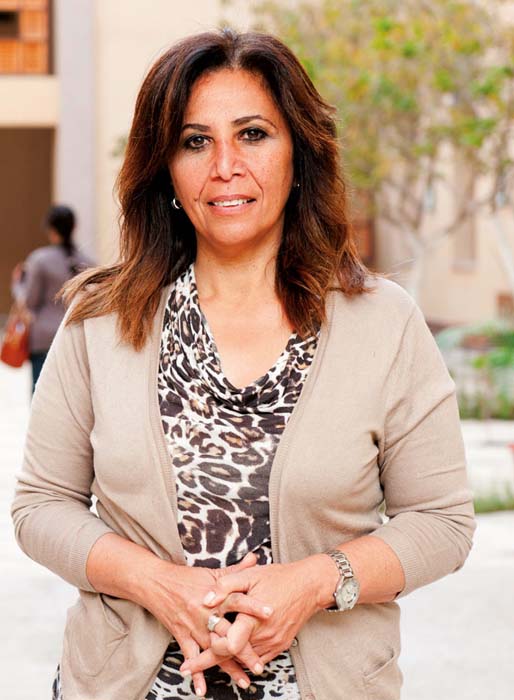 Photographed by Ahmad El-Nemr
Truth and objectivity are
paramount for journalists to
maintain their integrity. For
Shahira Amin '78, former Nile TV
deputy chief who has been working in
the media field for more than 30 years,
quitting her post on state TV during the
revolution was a matter of conscience.
"Throughout my years on state TV,"
Amin said, "I never felt restricted on
my talk shows and frequently hosted
analysts with anti-government views,
but this was the first time I felt that I
was jeopardizing my integrity as a
journalist, as well as betraying the
young activists who were putting their
lives on the line for the freedom of this
country. I didn't want to spread the
propaganda of the regime, even by
hosting guests who relayed such
messages. Press releases that we
had to read out stated that the
Muslim Brotherhood and
foreign agents were behind the
revolution, but what I saw with
my own eyes in Tahrir was an
all-inclusive people movement,
educated AUCians alongside
the working class, families in
their entirety fighting for what
they believed in. However, there
was immense fear of not
sticking to these press releases."
The breaking point for Amin
was on Wednesday, February 2,
when people on camels and
horses raided Tahrir Square and
attacked the protestors. "I was watching
Al Arabiya and was horrified to see
camels and horses storming through the
crowd," Amin recalled. "When we went
on air, we weren't allowed to say
anything about that. I felt that the
martyrs' blood would be on my hands
if I stayed. I went home feeling awful."
On her way to work the next day,
Amin had made her decision. "I sent an
SMS to my boss saying: I'm not
coming; I'm staying in Tahrir. I'm on
the people's side, not the regime."
Describing the elation in Tahrir when
Mubarak stepped down, Amin noted,
"The spirit was unprecedented. We
were all like friends talking to each
other, jeans alongside the niqab. For
years, the sense of patriotism was
lacking, especially among youth who
largely wanted to travel abroad because
they had no hope in the future. What I
saw that night was hope, optimism,
liberation, not being afraid to speak our
minds –– all this was new to us!"
But, like many other Egyptians, Amin
still hopes for more, particularly with
the restructuring of the media. "State
TV has to be the voice of the people,"
she said. "The newsgathering process
needs to be reorganized so that
reporters go out to find the story rather
than wait for press releases to be given
to them. There have to be clear
recruitment policies that are up to
international standards. No more wasta.
Journalists need to be given proper
training so that they don't write things
that people didn't say in order to
sensationalize the news. There has to
be a holistic re-assessment and
re-evaluation of the media."
Amin has returned to Nile TV to
host her weekly program, In the Hot
Seat, through which she recently
conducted an interview with U.S.
Secretary of State Hillary Clinton
during her trip to Cairo. "The reason
I've decided to return is my conviction
that you can push for reforms better as
an insider," she said. "I know that the
road ahead is long and difficult, but I
see light at the end of a very long
tunnel. We're not out in the light yet,
but we'll surely get there.
By Dalia Al Nimr
|
